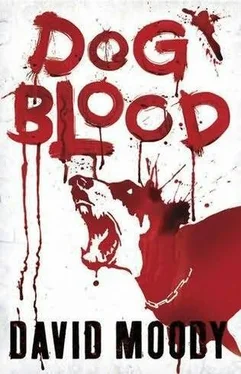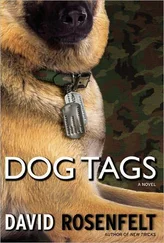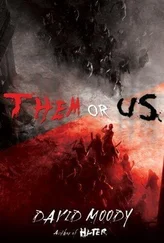“Just do it,” I yell at them. “Fucking do it! Kill me now and get it over with.”
Yet another one appears, looming over me. I can see this one’s face. He looks me up and down, then pulls the plastic stopper off the tip of a hypodermic needle with his teeth and spits it out. I try to arch my back and get away, but I can’t do anything to stop the fucker from thumping the needle hard into my chest.
WITHIN WEEKS THE MECHANISM for the ongoing distribution of food and medical aid to the population of the refugee camp had begun to falter and fail. In retrospect it had seemed a large-scale but reasonably straightforward undertaking, but, as what had originally been envisaged as a short-term operation dragged into its fourth month and with no end in sight, the situation continued to rapidly deteriorate.
The initial ground rules and hastily cobbled-together official procedures had been simple. Under military control, all resources were to be coordinated via the City Arena-a vast, cavernous, ten-thousand-seat concert venue. Its huge, soccer-field-sized concrete floor had been cleared, and all rations, supplies, emergency aid, and “collected” foodstuffs were held there under armed guard. Trucks full of provisions were shipped out to ten nominated distribution centers within the huge camp on a daily basis-a movie complex, the town hall, two sports centers, and various other similar-sized public buildings. From these centers food was distributed to the city’s population, who carried ration books with their identification papers.
By the beginning of the second month, supplies had already dwindled to dangerously low levels, the authorities having severely underestimated both the number of refugees requiring rations and the duration of their enforced incarceration. Similarly, they’d overestimated their ability to source and replenish food stocks. Officially acquired (looted) food continued to enter the city on a daily basis as a result of frequent military excursions, but it was nowhere near enough. More importantly, no more food was being produced. No crops were being grown and harvested, no factories were operating, every transportation and distribution system had been rendered unusable…
By midway through the second month, supplies had fallen to such a low level that the daily restocking of the ten distribution centers was reduced to every other day. By the beginning of the third month, deliveries were only being made weekly.
A black market emerged on the streets, and for a short while it thrived and flourished. Also in month two, a militia faction known colloquially as “the Milkmen” because of the herd of stolen cows they kept penned in on the heavily guarded field of a local soccer team, assumed control of two of the distribution centers. The irony of small-time criminals dealing in milk and occasionally beef alongside the usual staples of drugs and weapons was not lost on either the military, who tolerated their activities (it took some of the pressure off them), or the poor bastards forced to trade with them. Business boomed temporarily until the basic economic principle of supply and demand could no longer be applied. Food, water, and medicines became both the commodities and the currency. The demand was inexhaustible, the supply nonexistent. Trade stopped. The militia groups closed their doors, emerging only to attack and raid other distribution centers to continue to feed and water themselves. When even the black marketeers could no longer source enough food and water for their own needs, infighting took hold, and their previously untouchable operations imploded.
As the end of month three approached, the City Arena was all but empty, and eight of the distribution centers (including those previously run by the militia) had ceased to function. Of the three remaining sites, the Arena was now being run by the military, purely for the benefit of the military. One of the distribution centers housed in an old warehouse continued to be maintained by a rapidly dwindling group of do-gooders who were stupid enough to still believe in helping other people and who dutifully handed out almost microscopic portions to the ever-growing crowds continuing to line up outside the building twenty-four hours a day, seven days a week. Truth was, the only reason they were still in business was because they drip-fed provisions, literally a mouthful at a time. Perversely, the sheer mass of desperate refugees both protected the distribution center from the threat of militia attack and isolated it from the military authorities and supply routes.
This morning, the last remaining functioning distribution center-housed in a long-empty factory building-collapsed. The food supplies had finally run dry, and the news predictably caused a riot. The military commander responsible, overseeing the center from a safe distance, wasted no time in locking the site down and ordering the execution of the three hundred or so rioting civilians trapped inside. The public had to be controlled, whatever the cost. Disorder like that couldn’t be allowed to spread. The implications were unthinkable.
***
Three-quarters of an hour ago, Mark had left the cramped hotel room for the first time since returning from his final shift as a volunteer. Kate had pleaded with him not to go, but what choice had he had? He had a duty to provide for her and his unborn child, not to mention the other family members they’d found themselves unwillingly imprisoned alongside.
Walking the streets was a bizarre and frankly terrifying experience, and he quickly realized how much he missed the security of traveling with the military. Even being outside the exclusion zone with the army, surrounded by Haters, felt safer than this. He desperately tried to keep himself to himself, looking at the ground whenever he passed anyone else or looking over the heads of the crowds he walked through. He didn’t know where he was going or what he was hoping to achieve, but he had to keep trying. He couldn’t just sit there with the rest of them and wait for something to happen. They were starving, cold, and frightened, and he begrudgingly felt responsible for all of them.
Mark made his way in the general direction of the factory building where he, Kate, and the others had collected their rations in the past. He walked via Leftbank Place, an area of waste ground that had been planned for redevelopment for years. That was never going to happen now. He struggled to see through the never-ending mass of temporary shelters that blanketed the ground, making it look more like a third-world slum than anything else. The remains of entire families sat huddled together under polyethylene sheets, desperately clinging to their last few belongings and each other. For a while it made him almost feel grateful for the relative comfort and security of the hotel room where he and the others had been billeted.
It was obvious as soon as he got near the distribution center that it had closed down. Where he’d expected to find uneasy, virtually silent lines of people he now saw only an empty space. Any space was at a premium now, so the fact that people were completely avoiding the site was a bad sign in itself. He’d already decided to turn around and head back to the hotel before he saw bodies being dragged away. A drifting plume of hazy gray smoke drifted up from behind the large, boxlike building. He knew that was the smoke from a funeral pyre-a typical military cleanup operation. They burned all dead bodies now to stop, or rather slow, the spread of disease.
He changed direction gradually, so self-conscious and afraid of everyone else that he didn’t dare make any sudden alterations to his route, paranoid that people were watching him. He found himself at the base of the McIver Tower -the building where he used to work-and he allowed himself to look up just for a moment and remember. Up there, on the seventh floor, was where he’d spent endless hours before all of this had happened. Up there, alongside around one hundred and fifty co-workers, all sitting in front of identical computers, wearing identical headsets and working toward identical targets, he’d sold insurance and dealt with people’s claims. Those were the days, he thought, almost daring to smile, when a burst pipe or a broken window was considered an emergency… It all seemed so trivial and unimportant now, but it had mattered then. Not just to him, but to everyone. He’d struggled with the monotony of the job at times, but he’d have given anything to return to the boredom and routine of his former life now. He stopped by a telephone booth to look a little longer and tried not to look suspicious, avoiding making eye contact with the man who was sitting on the floor inside it, his back pressed against the door to prevent anyone else from getting in. Mark counted up to floor seven of the office building, then worked his way along to the window nearest to where he used to sit. There were people living up there now. Even from down here he could see them, hundreds of them packed in together, desperate for space. Around the base of the building, in a low-walled, rectangular area that had once been an exclusive parking lot reserved for company executives and senior managers, was an enormous pile of redundant computer equipment-hundreds of unneeded screens, keyboards, and tower units thrown out as the floors above had been emptied to make room.
Читать дальше












